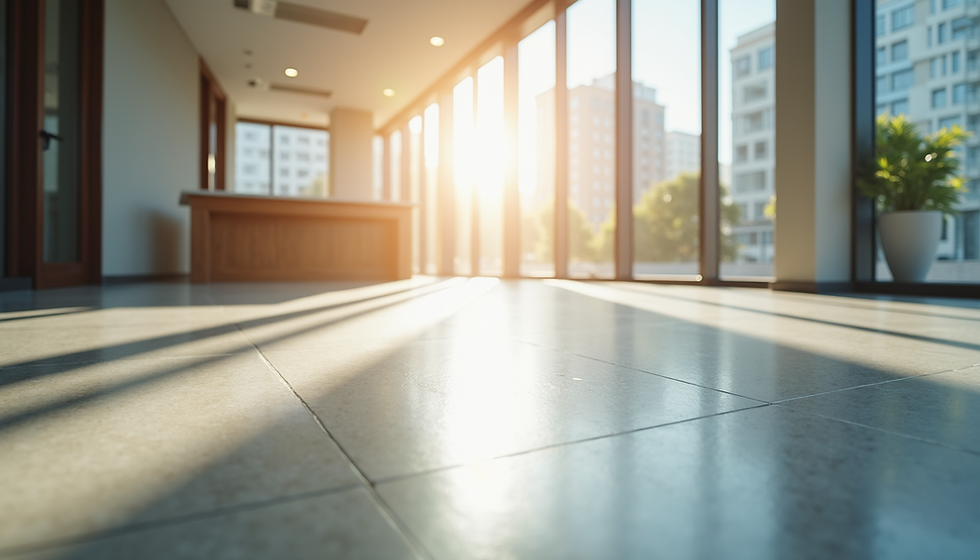Understanding Flexible LVT, Sheet Vinyl & More: Dive into the World of Resilient Flooring
- Carter Banks
- Sep 13, 2024
- 3 min read

In the world of flooring, resilient flooring stands out for its durability, versatility, and design flexibility. This category covers a range of products, including luxury vinyl tile (LVT), sheet vinyl, and rigid core flooring, each offering unique benefits for residential and commercial spaces. Whether you’re looking for water resistance, ease of installation, or affordability, resilient flooring provides a solution for every need. Let’s explore the options to help you choose the best one for your project.
What is Resilient Flooring?
Resilient flooring refers to types of flooring that are firm but have a slight "give" or flexibility, offering comfort underfoot. It’s designed to withstand heavy foot traffic, making it ideal for busy households and commercial spaces. Unlike traditional flooring like hardwood or tile, resilient flooring is made from materials that resist wear, water, and stains, making it durable and easy to maintain.
1. Flexible Luxury Vinyl Tile (LVT)
Flexible LVT is a popular choice in both residential and commercial flooring due to its stylish appearance and practical features. Available in planks or tiles, it mimics the look of natural materials such as hardwood or stone, but at a fraction of the cost.
Benefits of Flexible LVT:
Waterproof: Ideal for kitchens, bathrooms, and basements where moisture is a concern.
Comfortable: Offers a slight cushion, making it softer and quieter underfoot than traditional tiles.
Easy to Install: With its simple click-and-lock or peel-and-stick system, LVT can be installed without professional help.
Use Cases: Perfect for homeowners looking to upgrade their living rooms, kitchens, or even offices with the elegant look of wood or stone, without worrying about maintenance or water damage.
2. Sheet Vinyl
Sheet vinyl is another resilient flooring option that’s cost-effective and easy to maintain. It comes in large, continuous rolls, making it an excellent choice for rooms with high moisture exposure, as there are fewer seams where water can seep through.
Benefits of Sheet Vinyl:
Seamless Installation: Its large format reduces the number of seams, making it ideal for bathrooms and kitchens.
Highly Affordable: Sheet vinyl is one of the most budget-friendly flooring solutions, yet it still offers durability and water resistance.
Variety of Designs: Available in a wide range of colors and patterns, sheet vinyl can mimic hardwood, stone, or tile, allowing you to customize your home’s look.
Use Cases: Best suited for areas prone to spills and moisture, such as laundry rooms, kitchens, and bathrooms, where the water-resistant and seamless surface ensures long-lasting performance.
3. Rigid Core Vinyl
While not as flexible as LVT, rigid core vinyl offers enhanced durability thanks to its thicker construction. It’s designed to be more stable and withstand heavier traffic, making it perfect for commercial spaces or busy households. Rigid core flooring typically comes in two main varieties: WPC (Wood Plastic Composite) and SPC (Stone Plastic Composite).
Benefits of Rigid Core Vinyl:
Extreme Durability: Designed to handle heavy foot traffic and resist dents and scratches.
Waterproof: Like other resilient flooring options, rigid core is fully waterproof, making it ideal for any room in the home.
Realistic Designs: With advanced printing technology, rigid core vinyl can closely mimic natural wood or stone, giving your floors a high-end look.
Use Cases: Ideal for commercial spaces or high-traffic areas like hallways, entryways, and kitchens where durability is a must.
Key Differences Between LVT, Sheet Vinyl & Rigid Core
While each type of resilient flooring offers water resistance, comfort, and durability, there are key differences to consider:
Installation: Sheet vinyl requires more precise installation due to its large format, while LVT and rigid core vinyl are easier to install with DIY-friendly systems.
Flexibility: Flexible LVT offers more cushioning underfoot, making it a great option for comfort, whereas rigid core is designed for strength and stability.
Cost: Sheet vinyl tends to be the most affordable, while LVT offers a balance of cost and style. Rigid core is generally more expensive but delivers exceptional durability.
Why Choose Resilient Flooring?
Resilient flooring is an excellent choice for anyone seeking a balance of style, functionality, and affordability. Its ability to mimic natural materials like wood or stone, while providing water resistance and durability, makes it suitable for various environments. Whether you’re updating your home or outfitting a commercial space, resilient flooring offers the versatility to meet all your needs.
Find Your Perfect Flooring Solution
From the comfort and ease of LVT to the budget-friendly reliability of sheet vinyl, and the extra durability of rigid core vinyl, there’s a resilient flooring option for every space. Understanding the unique qualities of each will help you make an informed decision that best fits your lifestyle and design needs.
Ready to dive into the world of resilient flooring? Contact Magoflooring today for expert advice and professional installation services!



Comments